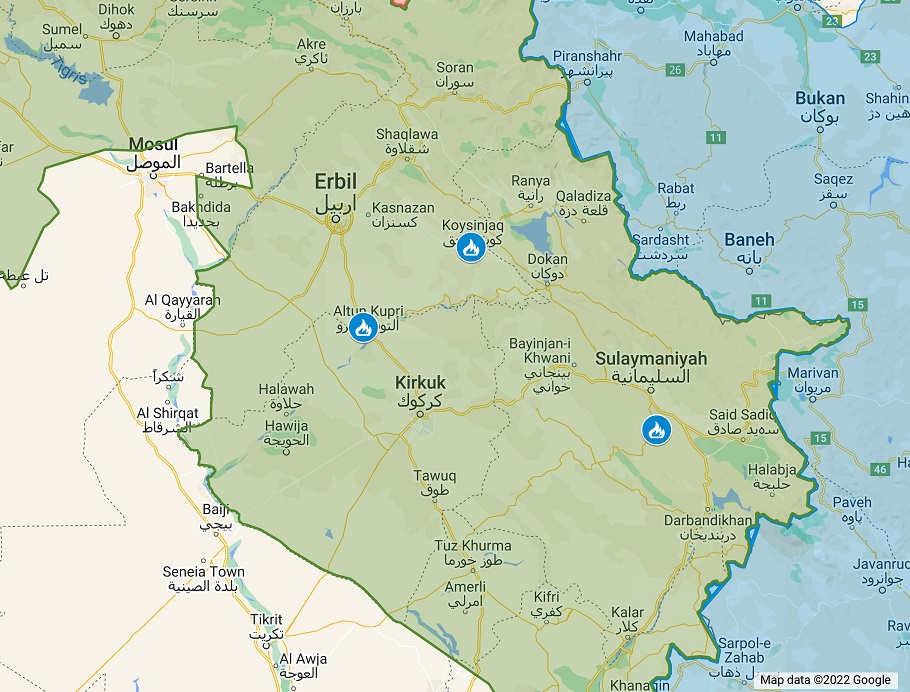1.3K
A weekly brief of events occurred in the Kurdistan regions of Iran, Iraq, Syria, and Turkey.
Iran
- Anti-regime protests continued across Iran for the third week in a row despite the regime’s intensified security crackdown and ongoing campaign of mass arrests. Iranian women kept burning their hijabs, and tens of thousands of protesters chanted “death to Khamenei.” At the same time, the death toll from the regime’s clampdown reached 100, including 23 Kurds killed by Iran’s Islamic Revolutionary Guard Corps (IRGC) in Iranian Kurdistan. The Hengaw Organization for Human Rights reported that Iranian authorities have wounded more than 1,138 Kurds since the demonstrations began. Iranian authorities have also arrested more than 2,000 people, including activists, writers, teachers, and athletes. On Sunday, several Kurdish cities heeded the calls of exiled Kurdish parties and held a general strike that shut down markets and businesses. In Tehran, Iranian security forces arrested and injured many university students after a demonstration on Sunday. Iranian authorities also broke up protests in Isfahan and Mashhad. Concurrently, clashes between Iranian security forces and Sunni protesters in Zahedan killed 19 and wounded at least 20. The European Union (EU) responded to the ongoing bloodshed by announcing plans to impose several sanctions on the Iranian regime. Concomitantly, the US Department of the Treasury’s Office of Foreign Assets Control (OFAC) imposed sanctions on an international network of companies involved in the sale of hundreds of millions of dollars worth of Iranian petrochemicals and petroleum products based in Hong Kong, the UAE, and India. Moreover, 36 US senators introduced a resolution condemning Iran’s “systematic persecution of peaceful protests.” That said, on Monday, Iranian Supreme Leader Ali Khamenei described the protestors as “mercenaries” and claimed the demonstrations were organized and supported by the US and Israel.
Iraq
- The IRGC struck several Iranian Kurdish opposition targets in Iraqi Kurdistan with suicide drones and ballistic missiles on Wednesday, September 28. The attacks, which followed several days of artillery bombardment, killed 17 and wounded at least 50, including civilians and members of Kurdish political parties in Koya, Sherawa, and Zergwiz. Among those killed was a US citizen of Kurdish descent that was working at a refugee camp in Koya. The US, EU, United Nations (UN), Kurdish and Iraqi officials, and several regional states quickly condemned the Iranian attacks, but the IRGC vowed more attacks if the Kurdistan Regional Government (KRG) did not expel all opposition parties from its territory. Also on Wednesday, US Central Command (CENTCOM) announced it had intercepted an Iranian drone “headed towards Erbil that appeared to pose a threat to CENTCOM personnel in the area.” Iranian artillery resumed shelling the Bradost area on Monday, and several Iranian drones were observed hovering over the Kurdistan Region. The Iranian regime has repeatedly accused Kurdish opposition parties in Iraq of supporting demonstrations protesting the death of Zhina Mahsa Amini.
- Iraq’s Council of Representatives held its first session in months amid tight security measures on Wednesday and rejected the resignation of its speaker, Mohammed al Halbousi. The Council of Representatives also appointed an independent Kurd as Halbousi’s deputy speaker to replace a recently resigned Sadrist lawmaker. That said, the Council of Representatives did not elect a new president, and talks between Iraq’s parties to form a new government led by the Iran-backed Coordination Framework continued. Separately, Iraqi Prime Minister Mustafa al Kadhimi traveled to Erbil and held several meetings with officials to address Iran’s recent attacks on Iraqi Kurdistan and unresolved issues between Baghdad and Erbil.
Syria
- Turkey and its Syrian allies intensified their campaign against the Autonomous Administration of North and East Syria (AANES), striking Ain Essa, Zirgan, Tal Tamer, al Shahba, and Kobani. Turkish artillery killed two children and injured five civilians in Hasakah Governorate’s Misherfa village on September 27. On the same day, a Turkish drone strike killed the co-directors of the AANES Justice and Reform Office, Zainab Mohammed and Yalmaz Sharo, near Derek. The AANES called for the US and Russia to enforce the ceasefire they have sponsored and guaranteed and stop Turkey’s ongoing attacks in northeastern Syria.
- The Syrian Democratic Forces (SDF) confiscated the “largest” ISIS (Da’esh) weapon cache since the physical defeat of the Caliphate in 2019. In a statement, the SDF announced they seized the weapons near Tal Hamees after intelligence information and confessions of several Da’esh terrorists arrested in al Hol Camp. According to the SDF, the terror group planned attacks to free its prisoners in al Hol Camp, similar to previous attempts. “This operation was another blow to the terrorist Da’esh organization and its supporters. It reduced its immediate capabilities, but it confirms once again the seriousness of the terrorist organization’s movements in light of some international parties ignoring the conditions that help it to survive, foremost of which are the threats of the Turkish occupation.” Read the SDF statement.
Turkey
- Six political parties led by the pro-Kurdish Peoples’ Democratic Party (HDP) officially announced an alliance for the 2023 elections in Turkey. The “Labor and Freedom Alliance” is the second opposition coalition challenging the ruling parties of Justice and Development (AKP) and Nationalist Movement Party (MHP). The alliance consists of the HDP, Workers’ Party (TİP), Labor Party (EMEP), Social Freedom Party (TÖP), Labor Movement Party (EHP), and Socialist Assemblies Federation (SMF). Separately, 34 more lawmakers face immunity lifting by the ruling parties, including the leader of the largest opposition party, Kemal Kılıçdaroğlu and Salihe Aydeniz, a senior Kurdish politician.

